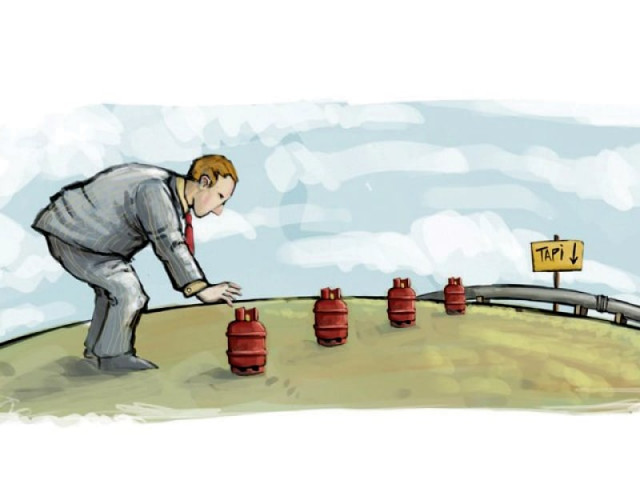TAPI pipeline: Officials to finalise contract award in Ashgabat next week
US lobbying to win lucrative contract for its energy giants.

Officials of Pakistan, India, Afghanistan and Turkmenistan are set to meet in Ashgabat next week to push ahead with a planned transnational gas pipeline connecting the four countries and reach a settlement on the award of the multi-billion-dollar project to US companies.
“The US is pushing the four countries to grant the lucrative pipeline contract to its energy giants. Two US firms – Chevron and ExxonMobil – are in the race to become consortium leaders, win the project and finance the laying of the pipeline,” a senior government official said while talking to The Express Tribune.
Washington has been lobbying for the gas supply project, called Turkmenistan, Afghanistan, Pakistan and India (Tapi) pipeline, terming it an ideal scheme to tackle energy shortages in Pakistan. On the other side, it pressed Islamabad to shelve the Iran-Pakistan gas pipeline because of a nuclear standoff with Tehran.
In 1997, US-based Unicol, which was the consortium leader to finance the Tapi pipeline, pulled out following directives of the US State Department, which feared that the royalty generated from the scheme would land in Taliban’s hands.
Unicol withdrew after Pakistan signed a gas framework agreement to secure cheaper supplies, leaving the country in the lurch.
According to officials, Petroleum and Natural Resources Minister Shahid Khaqan Abbasi will lead a delegation at the meeting of the TAPI pipeline steering committee on July 8 in Ashgabat.
Before this meeting, a technical group will hold talks on July 6 and 7 to settle technical issues pertaining to bid documents. At present, bid documents are being prepared in consultation with the Asian Development Bank, which is playing the role of transaction adviser. The documents will be given to the two companies only for taking part in the tender.
Chevron is lobbying in India, Pakistan and Afghanistan to clinch a deal, backed by the US State Department. However, other companies could also become part of the consortium that will be led either by Chevron or ExxonMobil.
A technically capable and financially sound company will be selected as the consortium leader, which will design, finance, construct, own and operate the gas pipeline that will start from Turkmenistan.
Officials pointed out that Chevron and ExxonMobil had not yet resolved the issue of gas extraction contracts for fields in Turkmenistan. They want the contracts against financing for building the pipeline, but Turkmenistan does not give onshore exploration rights to foreign companies and is offering offshore drilling concessions to the US firms.
To facilitate the two companies, Turkmenistan, however, offers to swap the gas extracted from offshore fields with that of onshore fields for export to Afghanistan, Pakistan and India under the TAPI project.
China wants to join TAPI
Officials revealed that China had also expressed interest in becoming part of the TAPI pipeline project. “Once the gas extraction contract issue is resolved, we will hold negotiations with Beijing,” an official said.
“The extension of the pipeline to China through Gwadar will give a boost to economic activities in Balochistan. Bangladesh has also expressed interest and if it formally joins, the pipeline will connect a wider region,” the official added.
Cheaper source
Pipelines are a cheaper source of gas compared to liquefied natural gas (LNG), which costs in the range of $16 to $18 per million British thermal units (mmbtu). Pakistan faces an acute shortage of gas, particularly in winter, as domestic resources fall way short of meeting its needs and it is weighing all options to secure energy supplies.
Under the TAPI project, Pakistan will receive 1.365 billion cubic feet of gas per day (bcfd) from Turkmenistan, India will also receive the same 1.365 bcfd and Afghanistan will get 0.5 bcfd.
Turkmenistan will export natural gas through a 1,800km pipeline that will reach India after passing through Afghanistan and Pakistan.
Published in The Express Tribune, July 5th, 2014.
Like Business on Facebook, follow @TribuneBiz on Twitter to stay informed and join in the conversation.



















COMMENTS
Comments are moderated and generally will be posted if they are on-topic and not abusive.
For more information, please see our Comments FAQ